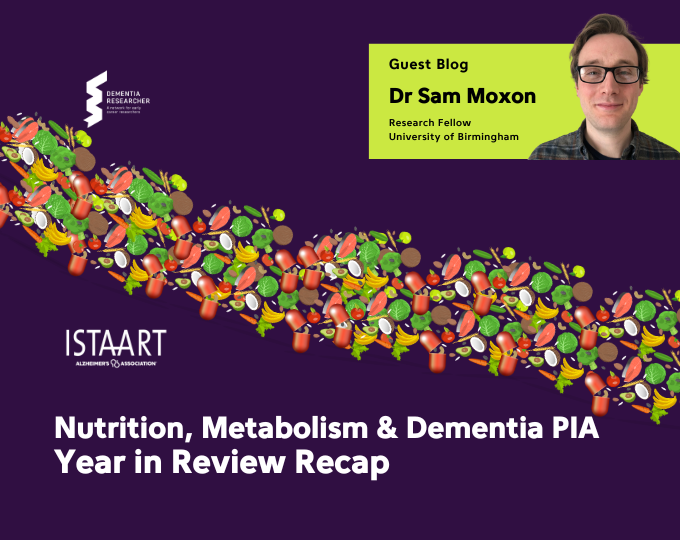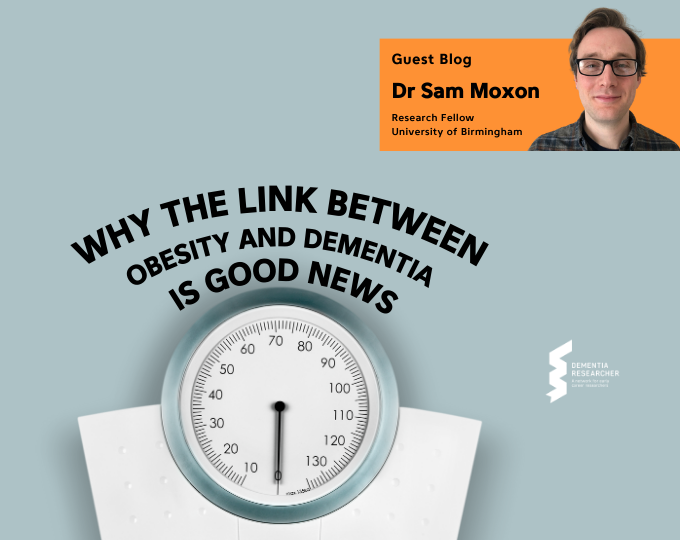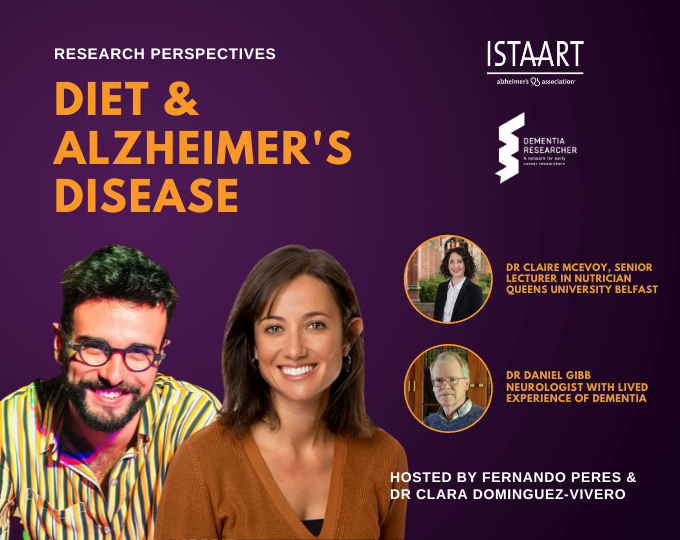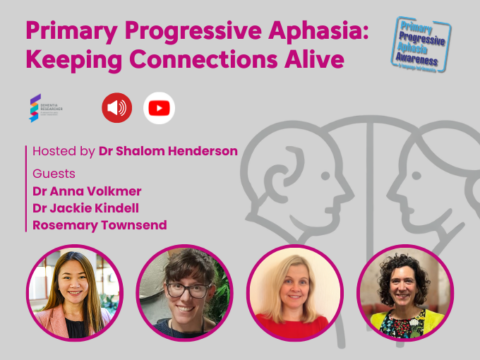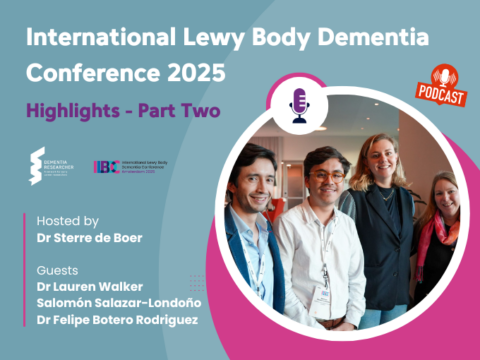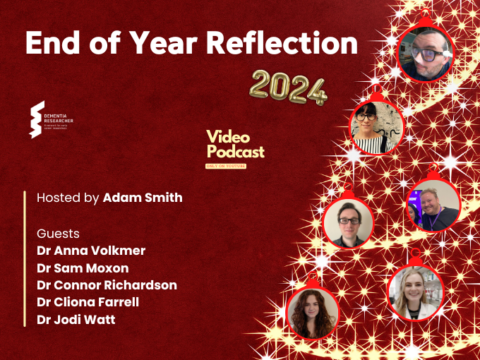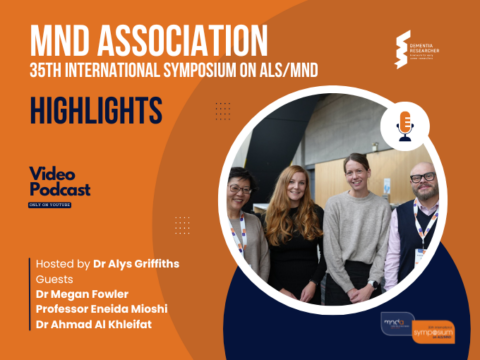In this episode of the Dementia Researcher podcast, Dr Sam Moxon interviews Dr Michael Klaper discussing the impact of diet and nutrition on brain health and dementia.
They explore the importance of a plant-based diet, rich in antioxidants and phytonutrients, for maintaining brain health. They also discuss the negative effects of ultra processed foods and animal-based diets on brain health. Dr. Klaper emphasises the importance of sleep, exercise, and stress management for overall brain health. He also suggests practical tips for transitioning to a plant-based diet, such as incorporating more vegetables and legumes into meals and exploring international cuisines.
See more in the Food for Thought series.
Voice Over:
The Dementia Researcher podcast. Talking careers, research, conference highlights, and so much more.
Dr Sam Moxon:
Hello everyone. Welcome to the Dementia Researcher podcast. Today, our Food for Thought series returns, and we're going to be finding out more about the power of using diet and nutrition in the fight against dementia.
Hello. I'm Dr Sam Moxon and I'm a research fellow at the University of Birmingham, and I spend a lot of time looking into ways that we can improve our brain health with what we eat. We've already heard a lot about dietary approaches in preventing Alzheimer's disease, but I often find myself asking the same question. What should and shouldn't I be putting on my plate? Now to help me get to grips with this is physician, author, and all-around health guru, Dr Michael Klaper. It's an honour to have you here, Michael, and welcome to the podcast.
Dr Michael Klaper:
It's lovely to be with you, Sam, and all your viewers. Thank you so much for the invitation.
Dr Sam Moxon:
Yeah. It's great to have you here and let's get into the discussion, shall we?
Dr Michael Klaper:
Sure.
Dr Sam Moxon:
Dr. Michael Klaper, welcome to the podcast. Now, we're going to talk a lot about food, diet, health, the science behind it, but I always like to start with my favourite question of the episode, which is what did you have for breakfast today?
Dr Michael Klaper:
Oh. Actually, I have not eaten. It's only at 9:00 in the morning here. I've been delaying my breakfast until about 10 or 11 in the morning if I'm not really hungry. So, I've just been drinking water this morning. I've got some sparkling water with cranberry juice in it, but so far that's all I've had. But-
Dr Sam Moxon:
So, what will you have for breakfast?
Dr Michael Klaper:
When I'm hungry, I do usually have porridge and fruit and almonds and various seeds in it.
Dr Sam Moxon:
That's the most popular answer on this show and it's actually the breakfast that I had today. Oats, chai seeds, flax seeds, blueberries, mango, sunflower seeds. It ticks off so many nutritional boxes first thing in the morning and sets you up really nicely.
Dr Michael Klaper:
Indeed.
Dr Sam Moxon:
So I think we should start then by, for anybody who's not come across your work before, a little bit of an introduction and so if you can just take a couple of minutes to tell the listeners and the viewers who you are, what you do and the story behind what inspired you to go into this avenue of work.
Dr Michael Klaper:
Okay. Well, I'm a classically trained western physician. I graduated from the University of Illinois College of Medicine in Chicago. I've had postgraduate training in internal medicine, surgery, anaesthesia, obstetrics at the University of California San Francisco. And for the first seven, eight years of my medical career, I assumed I was going to be doing blood and guts medicine all my entire career, but my patients were not benefiting from my labours. No matter how hard I worked, I watched with dismay as my patients were getting more obese, more ill. I'm getting calls in the emergency room that Sally is in with a stroke and Joe is with chest pain from a heart attack. And I felt like a failure as a GP, so I entered anaesthesia training to become an anaesthesiologist, and while on the cardiovascular anaesthesia service dealing with people's hearts and blood vessels day after day, I'm putting people to sleep and watching surgeons open their chest and open their arteries in their heart and pull out this yellow greasy duct from their arteries called atherosclerosis that was causing the heart attacks and strokes.
And there were already studies in the literature showing this is largely the fat and cholesterol from the animals these people are eating. And there were even studies showing that a whole food plant-based diet can melt away these plaques. Saw the first such study in 1977. Well, my father died of clogged arteries. I know I've got genes, and I started getting a bit anxious saying, if I don't change my diet, it's going to be my body on that operating table with that striker saw going up my sternum. Sure, didn't want that. And so, I changed my diet to a whole food plant-based one, and my body loved it. Within 12 weeks, a 10-kilo spare tyre of fat around my waist melted away. My high blood pressure came to normal; my high cholesterol went to normal, and I felt great waking up in a nice lean body every day.
And at that point I realised I didn't want to be an anaesthesiologist anymore and spend my career literally putting people to sleep. I'd rather go back to general practise and help them wake up. And so, I did, much to the dismay of my parents as I left with at least six months to go in my anaesthesia residency. You know the money you're giving up? But if it's not [inaudible 00:04:43] your life path, then you can't really pursue it and so I left anaesthesia, went back to general practise, but now I knew what to tell those patients who were getting more obese and ill and clogged up. Change your diet to a whole food plant-based one. And I found people in my local area who could give plant-based cooking lessons and my patients who learn how to adopt to a plant-based diet experience the same wonderful improvements in their health. They got leaner, their high blood pressure went down, their diabetes improved.
They turned into normal healthy people right before my eyes and their eyes. And at that point I became the happiest doctor I know because my patients were healthy. So, at that point, this was back in 1981, there's no turning back at that point. Once you look behind the curtain, you can't pretend you don't know what's behind the curtain. Now I knew what was behind the curtain. So, I've been a plant-based physician ever since and week after week, journal articles show up documenting the benefits of a whole food plant-based diet in so many medical conditions is clearly the way ... I was going to say the way of the future, but it's really the way of the present now. Best thing our fellow physicians can do is help our patients adopt a plant-based diet. And I'll be glad to talk to you further about it, but that's how I wound up sitting in front of you here today.
Dr Sam Moxon:
It's a wonderful story and I think it is a story that we need to hear more of because there's still a lot of myths surrounding plant-based diets. And we spoke off camera at the start of this. I saw your TED Talk and adopted the diet and went from a ... I was diagnosed with a chronic inflammatory bowel condition, told that, "There's nothing you can do. This is your genes. Just take the medicine, hope we don't get too many side effects." And when I started talking about diet, "No. That's not going to make an impact." And it has. It's been the difference between me being in hospital on a steroid drip to being out their gym every day, sauna every day, living my best life and all the things I was told I wouldn't be able to do like put on muscle mass, feel alert, feel not feel tired all the time.
I had no idea that feeling tired after lunch wasn't normal. And now I have so much energy and I found my brain feeling sharper and I started to think, is this affecting my brain? And obviously it does, doesn't it? You talk a lot about food as information. I like that phrase. The stuff that we put into our digestive tract does so much more than just give us calories. It gives us information. And I want to start by asking you is can we have a general overview of how the food we eat ... Let's stick to the brain for now because this is a dementia podcast. How the food we eat has an impact on our brain. The most important organ of the body, arguably.
Dr Michael Klaper:
Well, we need to understand some basic physiology, some basic plumbing if you will. When we eat anything, the digestive system is so efficient. The enzymes in the stomach and the small intestine, the pancreas, et cetera, within an hour certainly, but most of the food is broken down into its constituent, vitamins and minerals, amino acids, et cetera and they flow throughout the body, but there's a large circulation up to the brain, of course. So, people should just realise that whatever they're eating, good or ill, within 10, 15 minutes, it's going to be flowing through your brain and it's going to have whatever effect it has. And we can't kid ourselves that one reason people drink alcohol is because of the effect that it has on the brain. Clearly food has an effect. Well, we're learning more and more that the brain is such an exquisite and complex organ, but it shares some characteristics with all the other organs in the body. The heart, your liver, your spleen. It's got a rich blood supply and blood is life. You want a rich, oxygenated blood flow flowing to all your tissues, especially your brain.
And so, one thing if we want to avoid dementia is keep those arteries and the smaller vessels bringing nourishment to your brain tissues, keep those arteries as open and non-inflamed and pristine as you possibly can. And so, the advice that we give people who have clogged arteries in their heart or in their legs anywhere else, certainly applies to the brain. Absolutely. The word for blood vessels or any vessels is vascular, so vascular health is step one as far as avoiding dementia. Keep those arteries open. And then we can spend several broadcasts talking about all the things that make those artery walls inflamed and atherosclerotic plaques accumulate there. But it's largely surprise, surprise, most of the processed foods that have lots of free radicals. The French fry oil from fried foods, fish, and chips, et cetera. You're eating all the fryer oil. And we do it with our French fry potatoes here. But the sugars and the high temperature cooked meats. All these create what are called advanced glycation end products, AGEs, and they tear up the lining of the blood vessels and they open the door to inflammation of the arteries and plaque formation, et cetera.
And again, we could spend the rest of the talk showing what is so destructive just to blood vessel health when it comes to the western diet, and we can drill down specifically on that. So, there's the blood vessel component, which is huge. And when people talk about Alzheimer's dementia and they say, oh, there's tau protein and beta amyloid, but people don't realise there's a huge vascular, a blood vessel component to these dementias and when you look at the arteries of people died from Alzheimer's dementia, you see the arteries in their brain. The middle cerebral arteries are thickened, the walls are thickened, the linings are swollen. These are not healthy arteries. And so, what could cause that? Is it just genetics? No, of course it's the food flowing through those arteries, meal after meal, hour after hour, day after day, month after month, year after year. And so, dementia, Alzheimer’s, and others, is not a condition that falls out of a tree on you at age 70.
This is the accumulated damage starting with the blood vessels that we engender, that we set off on its pathway early in our lives. It's been said ... It was kind of shocking statement I first heard it, but a cardiologist said, "When you think about it, Doc, atherosclerotic heart disease is a paediatric disease." This disease really starts in childhood. And when they do autopsies on children killed in car accidents already at age nine and 10 years of age, you can see the yellow atherosclerotic plaque starting to develop on the inside of their arteries. So, it's a lifetime disease that finally at age 40 or 50 finally manifests as a heart attack or stroke. Well, given the big vascular component to Alzheimer's dementia, all these dementias, can we not say similarly that these vascular dementias are ... It's a paediatric disease. It really starts in childhood. And we think of what western kids are eating these days, all the fried food, the processed foods, the sugars, the hydrogenated oils, et cetera.
Boy, it'd be harder to think of a way to damage the lining of the arteries than if you took a piece of sandpaper or a nail file and roughed them up. It's chemically what happens from these foods. So, it's a lifetime of artery abuse, if you will, is step one of the dementia process. Those blood vessels are choked down. And when any tissue in the body, heart, muscle, nerve, et cetera, is chronically shortchanged of blood and oxygen and nutrients, as the months and years go by, dysfunction is going to happen. The muscle cells won't contract as well, the nerve cells won't fire as well. And surely those early signs of dementia have a component at least of loss of blood flow. There's a low-grade ischemia, which is a word for saying lack of blood flow. So, there's the whole blood flow issue that we need to pay attention to.
A good piece of hopeful news is that in the same way as Dr. Esselstyn and Dr. Ornish and others have shown us that atherosclerotic plaque disease in the arteries actually is reversible. A diet that is filled with whole plant foods and bathed the artery walls with these antioxidant nutrients can actually melt down those plaques, can help heal the artery walls or restore nitric oxide production and the arteries can help open up and blood flow will increase. And so, all is not lost. But again, as I say, your body is looking. There's no fooling it. Who are you kidding? You can't say look over there to have a cheeseburger there. Your brain knows, your arteries know. And so, Shakespeare said, or should have said, to thine own health be true. It really, it's true when it comes to our diet. We treat food these days as an entertainment activity when really is this going to help my brain function or not, this food I'm thinking of eating, is really key.
So, what can people do? Be kind to your arteries and ... Gorillas in the wild don't get atherosclerotic vascular disease. They don't get Alzheimer's dementia as far as we know because their diet's a steady stream of leaves and fruits and vegetation. And we should really follow their example. And I've dwelled as long as I think we need to as far as the blood vessel component and how important it is to be kind to your artery walls. But clearly, and I'm not a neuropathologist, I'm not an Alzheimer researcher unlike you, but there's probably other factors as well that are directly toxic to the nerve cells. Of course, we well know that chronic alcohol ingestion ... Alcohol is a toxin. It kills every organ and every tissue that it touches. And again, we get Wernicke's disease and various alcohol driven dementias, if you will.
Well, how about the western diet as a whole? As that food stream is flooding through the bloodstream, are there molecules in that food stream that are directly toxic to the neurons, to the brain nerve cells in there? And when you think of all the preservatives and colouring and yellow number three dye, and again, the polyunsaturated oils that are heated and the fried foods, there's surely a direct toxic effect upon the neurons. And again, the chronicity of this week after week, month after month, year after year, you're bathing your brain cells with these low-grade toxic molecules. Can we be shocked if by age 80 or 70, whatever, you don't recognise your wife? And so, we're holistic organisms. You got to heal the entire body, take care of the entire brain, blood vessels, nerve cells, etc. And again, follow the lead from our gorilla and bonobo cousins there. We are plant eating hominids. If we stay true to that basic underlying metabolic truth, hopefully we'll get to our 110s with a clear mentation and remember where we put the car keys.
Dr Sam Moxon:
I think that's a really nice perspective and the stuff about seeing the atherosclerosis in children, that's terrifying to realise it can happen that early on. But you talked about what else could be in the foods and you see a lot of studies people say, "Oh, well, ultra processed foods are perfectly safe because studies have been done." But usually, it's very short-term studies to show that there's no acute negative effects. But we're now seeing long-term studies that contradict that. I sat in on a nutrition and dementia roundup for last year, which highlighted a lot of the discoveries around nutrition and dementia and it's good to see more studies being conducted in that. And we're going to touch in on this throughout the conversation. But the reason I mention it is because you talked about how other things in the food may be also contributing. And when people defend processed foods, they talk about studies that are showing they're safe, but these are very short-term studies showing there's no acute ill effects.
But actually, we're now seeing long-term studies. And one thing that I found quite alarming was there was a study around ultra processed foods and dementia. It's one of these studies where they follow thousands of patients over time. It was one of the hospitals in America. I can't remember which one. But they showed an almost dose dependent relationship between ultra processed foods and dementia prevalence. So, if you were in the high ultra processed foods category, you were up to five times more likely to develop dementia. And so, when you equivalate out all the other factors and just look at the food, clearly there's an association between what we're eating and our brain health. And I suspect it's not just ... We talked about the vasculature, but it's the fact that all our body is connected. So, when we eat something, it goes into our gut, our gut microbiome digests it, they release factors, those factors get into the bloodstream, that reaches the brain, and it starts to have neurotoxic effects. You see things like vascular damage on a molecular level where the brain becomes leaky, and I'm convinced there's things in the food that are getting into the brain and causing that damage. I'd be interested to get your perspective on that.
Dr Michael Klaper:
Indeed. Absolutely. Again, the body's looking. If those molecules flow through the bloodstream that the human body, the human brain has never seen before in human history. These are alien molecules, if you will, that are flooded through the brain with every meal. Every time you open that bag of chips or whatever, you're really injuring ... You're certainly not helping your brain function to say the least. And so, we need to realise we are living in unprecedented times and yet your body just wants healthy food like it's always been eating. And again, that comes down to whole plant foods.
Dr Sam Moxon:
Yes, definitely. And the question I mentioned at the start is what we should and shouldn't be putting on the plate. And I think it's fairly obvious what we shouldn't put on our plate. Anything that's got a list of ingredients that's 30 lines deep, most of which sound like chemicals, things you wouldn't find in the food cupboard. What should we be putting on our plate? Where should the focus be? The key vitamins, the key minerals, where should we be looking for that?
Dr Michael Klaper:
Well, Mother Nature, she's a great chemist and she puts together whole plant food. She puts together carrots and kale and peas and beans, etc. Not only are there macronutrients, but there’s also amino acids for protein, there is lots of carbohydrates for energy. Yay. But also, in every leaf of kale, there are hundreds of substances, and that's a shorthand for all these whole plant foods, that bring in all sorts of wonderful properties. They flow through every cell in our body where our DNA lies unfolded and whatever you eat, the food molecules flow through your cells and they wash over your DNA and they play your DNA like a piano, and they turn genes on, they turn genes off. It's called epigenetics. They induce enzymes. They shut enzymes down. Every meal changes us on a genetic molecular level. Food brings in not only nutrients, but it also brings in information. It changes us.
And again, chronicity, the effect over time is really important. I don't know how many people work in the garden anymore, but when I was a kid on our farm ... All right. And early in the spring there, you take your hoe, and you start breaking up the clods of the soil there. And if you don't wear gloves, the first day or two, your hands don't react too badly. But as the weeks go on and you're holding that hoe hour after hour, eventually the skin is getting chronically rubbed. It's going to react. It's going to thicken the skin there. You're going to develop calluses there. The body reacts to chronic stresses. Well, the same thing if you're constantly with every meal bathing your brain tissue with sugars and oils and all sorts of artificial constructed chemicals, as the weeks and months go by, they're going to have an effect just like the chronic stress on your hands there.
And so again, to thine own brain be true on this one. And the nutrients that the whole plant foods have, they generally are quite benevolent as the phytonutrients, the plant nutrients flow through our tissues and they turn on genes. These are genes that promote tissue repair, which promote membrane stabilisation, which neutralise free radicals, which give the chemical message to your tissues of, "Shh. Calm down. Everything's okay." Because if you're just eating rice and beans and greens, this is not a pro-inflammatory diet, unlike cooked meats and sugary drinks, etc. And that was the third component, I guess, regarding dementia. We talked about the blood vessel health, how important that is. We talked about genes that are turned on and off in direct toxins.
There's the element of inflammation. We are now seeing that inflammation plays a role in just about every disease. Who knew? But now when we look for it, we're finding inflammation in the artery walls and tissues all over the body. Well, the same thing in the brain there. Even a low grade level of inflammation around your nerve cells is not healthy and the beauty of whole plant foods is they quench the inflammation. And so, all the way around those lovely salads and big hearty vegetable soups and big plates of steamed green and yellow vegetables flood the body and the brain now with these nutrients that again, are stabilising, that promote tissue repair, that quench inflammation. And so again, ask any gorilla, that a whole plant food diet is very gentle with nerve function, with brain function.
Dr Sam Moxon:
And this leads me on to the next question. It's a question I get asked a lot by my friends who still eat meat. They say, "Well, can't I just increase the number of plants on my plate? And how does that compare to going fully whole food plant-based? What if I just adopt a more say Mediterranean diet and just, I get more vegetables, more fruits, more lesions, but I'm still going to have my chicken, still going to have my beef." How does that compare?
Dr Michael Klaper:
Well, I commend them for wanting to eat more vegetables. That's always a good thing. But we just have to realise we're not carnivorous apes. No, you won't see any gorilla munching on a steak or even a raw animal that it's captured and killed and eaten. They are herbivorous creatures. And because we don't know in each raw meat, we have to start at the basics. The very act of cooking animal muscle, grilling the burger, broiling the steak, frying the chicken or the fish, the very act of adding heat to animal muscle immediately denatures that animal tissue in very destructive ways. The heat rips electrons off cholesterol molecules. All animal muscle has cholesterol and cooking it rips electrons, oxidises the cholesterol, and it's the oxidised cholesterol molecules that are the most atherogenic that burrow their way into the walls of the arteries and set off the atherosclerotic plaque formation.
So again, the very active cooking the animal muscle is destructive right there. The mediums ... And again, because people, when they're going to cook the meat or whatever, the squirt of oil goes in the pan there and the very act of heating those oils creates free radicals that bathes the meat there and so you're eating the fryer oil and all of that. And again, when you heat animal muscle, you create what are called, as I mentioned before, advanced glycation end products. What are these? These are ragged molecules left over from oxidising both the amino acids and the sugars. Is there sugar and meat? Yeah, there's a type of sugar molecule called glycogen that's in the animal muscle. You broil the steak, you grill the burger, and you're going to get these AGEs formed. And they are teeming with free radicals. These are atoms that are missing an electron, and they are like molecular terrorists.
They will rip an electron off any passing molecule, your proteins, your cell membranes, your DNA. You don't want to be eating food with a bunch of free radicals in it. And that's exactly what you're eating when you eat cooked animal muscle. You're going to be eating all these AGEs. Don't worry about the name, remembering advanced glycation end products, but remember the acronym, the AGE. This ages you when you eat this stuff. And so, we can talk over a glass of herb tea about all the different mechanisms by which eating animal muscle injures tissues in our body.
And it gets to the point of who needs this? Why do this to yourself? If you're eating food to nourish yourself and to provide the calories and the protein and the vitamins and minerals, why in the world also ingest molecules that damage your cells, that tear up your DNA, that create free radicals. Again, those whole plant foods. When you steam broccoli, you don't create AGEs. But when you fry chicken, you certainly do. So again, we could go on and on, but these people are kidding themselves. Well, I'll just eat more vegetables while I'm also eating my free radical AGE laden animal muscle with every meal. Who's kidding who at that point? This is delusional thinking as far as I'm concerned.
Dr Sam Moxon:
Well, it's interesting as well. Like I said, there's quite a lot of myths around this diet, and particularly plant-based and things that you'd be missing and that kind of stuff. And that seminar that I sat in that I mentioned earlier, when they talked about ultra processed foods, another study, it looked at different dietary approaches and which were the most powerful for reducing the risk of Alzheimer's disease. And they focused on three diets. One was Mediterranean, one was ketogenic, which there was a strange phenomenon there where it seemed like this study showed saturated fat was good if you had Alzheimer's disease, which I'm still trying to rationalise, but we'll move away from that. The one that seemed most interesting to me is the most powerful diet that was put forward based on multiple studies was the MIND diet. And the MIND diet is essentially just a whole food plant-based diet, but you consume fish for omega threes. But that tells me that the plants are powerful and actually you don't need to consume fish to get omega-3s. You can get them from or the sources. And so that's my next question for you. Is it possible to get the same quality of omega-three fatty acids, which are obviously heavily associated with brain health, from plants?
Dr Michael Klaper:
Oh, absolutely. In fact, plants are the only source of these omega-3s. And for the chemists in the audience here, we're talking about long chain fatty acids that have double bonds scattered through the molecule. And if you run into the first double bonded carbon atom number three, it's an omega-three fat. And they certainly have anti-inflammatory properties as well as the brain cells will incorporate these fats and use them for new membrane synthesis and its mother's milk to the brain tissue here to have sufficient omega-3s in your diet. So where do they come from? Well, again, only plants make them. No animal makes vitamin ... Fish don't make vitamin B omega-3s. Where do they come from? As I said, only plants make them. Here on land omega-3s are made by all ... All green plants have a little bit of omega-3s in their cell walls there. But there are some plants that have an abundance, and those are usually the nuts and seeds. You're talking about flax seeds, hemp seeds, chia seeds, walnuts. English walnuts actually.
And so, it's important to have a supply of that in your daily diet. And so, on my porridge, I'll put a couple tablespoons ... We have a jar full of ground hemp, chia and flax seeds all ground up. I'll throw a couple of tablespoons of that onto my oatmeal. I'll always have a handful of walnuts. We throw it onto the salad. And so, what about the fish? Well, again, fish don't make these omega-3s fats. They're swimming in the ocean all day with their mouths open. And what they're doing, they're swallowing algae cells and it's the algae cells, the plant cells that really make the omega-3s. And so, the fish swallow the algae, the omega-3s are deposited in their tissues. And yes, you can kill the fish and eat the fish and you'll get the omega-3s. But they were algae, plant-based omega-3s from the beginning and no one really needs to eat the fish.
And now that we're clear-cutting the ocean, we're strip-mining the ocean of fish there, it's time to, I plea, to let the fish off the hook at this point. We don't need them in our diet. They're becoming contaminated. And you get the omega-3s from, again, the greens and the nuts and the seeds, etc. And if someone really feels they need extra omega-3s, you can purchase at any natural food store. They're taking these algae, the make the omega-3s, they grow them in big vats. They harvest the algae, and they extract the omega-3s and they put it into these veggie caps. Take one of those if you want. It's a little [inaudible 00:33:12]. But there's no reason to be eating fish in the diet there. And so, the MIND diet sans the fish, yeah, sounds like the best diet. Sure.
Dr Sam Moxon:
And I think omega-3s joins a long list of things that we're told are good for the brain you can't get from a vegan diet. But when you look at those sources from an omnivorous diet, they're second-hand sources. A good example is Vitamin B12. And they say, "Well, you have to take a B12 supplement." Well, I guarantee unless you've gone to an expensive ranch and bought grass-fed beef, the B12 in your steak was also supplemented because they are not getting fed the sources of B12. Either they're getting fed soy or they're getting fed slurries. So, this argument that we have to supplement B12 and as someone eating meat just doesn't ring true. And actually, there's food sources of B12 in a vegan diet as well. Nutritional yeast, marmite, which is one of my favourite foods. It's love it or hate it over here. Plant milk is often fortified with B12. And so, I've not found a nutrient yet that I can't get from plants.
Dr Michael Klaper:
I agree. Let me expound on that a little bit. That's really important because you mentioned it as far as things that might tip the scale towards Alzheimer's or dementia. Chronic deficiency of vitamin B12 in the brain tissue, that's no joke. That's serious business there. You don't want to have a B12 deficiency. So again, for our omnivorous friends who say, "Aha, see, you need B12." Let's talk about that. Vitamin B12 is an amazing, beautiful molecule, but animals don't make it. Cows don't make it. Chickens don't. No animal makes vitamin B12. It's made by microbes that live in the soil and cows have B12 and chicken or geese and grazing sheep have B12 in their muscles because they're eating grass all day and they're pulling up clumps of grass that have particles of soil cleaned to the roots and in those soil, particles are the microbes that actually create the B12. And so, the cow, the sheep swallows the B12, it's deposited in their muscles. And yes, you can kill the sheep or the cow and eat the meat and you will get the B12 that way. But the cow didn't make it. It was bacterial B12 from the beginning.
And thousands of years ago, millions of years ago, we got our vitamin B12 the same place the sheep and the cows do because we would spend all day foraging, pulling up roots and tubers and starchy vegetables. And we didn't wash them under chlorinated drinking water. There was always some soil on the surface of the veggies, and we'd eat that. We would get some B12 that way. When we were thirsty, we'd find the nearest stream and drop down and drink stream water. There'd be B12 in the stream water. Back then, the same B12 that the cows and the sheep and the antelope where ingesting was flowing through our intestinal tract as well. We were living in harmony with nature and B12 deficiency wasn't an issue.
But welcome to the 21st century. Nobody's eating unwashed vegetables, nobody's drinking out of streams. And that's okay. I don't want to be treating cases of cholera and typhoid fever from water. That's okay. But in exchange for modern sanitation, for chlorinating the drinking water supply, et cetera, we've lost the "natural" sources of B12 in our diet. And it's for that reason that the plant eater needs to take some supplemental B12. But again, it's our bargain, our deference with modern sanitation. It's not the vegan diets are inherently deficient. Nothing is natural in this modern life. We're all doing the best we can and to make a stance on this. And what are we going to do? B12 supplements on vegan diets are not natural. That's silly. We're all doing the best we can to get our nutrients in the most practical way and supplements or fortified yeast, marmite, et cetera, is the way to do that.
Dr Sam Moxon:
Yeah, exactly. And I think another question I get asked is starting points as well. So, somebody wants to try and make their plate healthier. And so, we talked a lot about antioxidants and sort phytonutrient-rich foods and how these can contribute to brain health. So, if someone came up to you and said, can you suggest to me five ... Let's say minimum five, maybe 10 plant foods that are rich in these antioxidants phytonutrients that they can easily incorporate into their daily diet to support their brain health. What would your first suggestions be to somebody who wants to know that?
Dr Michael Klaper:
Oh, what a wonderful question. And again, we have these eyes with wonderful colour vision, and that really should be our guide here. All these rich, vibrant colours are filled with these antioxidants and phytonutrients. And so, make it a point to eat as much in the way of richly coloured vegetables as you can. What are we talking about here? The two most powerful colours, if you will, are green and yellow. Have as much dark green leafy greens as you can. I have a big salad every day with dark lettuce in it and shredded kale, et cetera, or even lightly steaming these dark leafy greens is a key. You should have something dark and green every day. Fact, have a big salad every day. Make it a point if you ... Where do I start eating healthy? Have a big salad every day. And in that salad, you want, again, something dark and green.
You want something yellow. Carrots, squash, sweet potatoes, yams. And you can shred them into a salad. You can steam them and throw them into the salad, et cetera. But something dark and green. Kale, collards, Swiss chard, Bok choy, these dark leafy greens. Something yellow. The carrots, kale, the carrots, sweet potatoes, squash, et cetera. But now we're understanding that even these other richly hued vegetables, the purple vegetables, the purple sweet potatoes, and the purple cabbage have a wonderful rich assortment of these very powerful phytonutrients that neutralise the free radicals there. So green, yellow, purple. Those are the three good colours to focus on. And you need some protein and a good way to get that is what my wife and I do. She'll make these glorious salads and then she'll open up a can of chickpeas, garbanzo beans or navy beans, white beans, and put them right on the salad there. And already, we've made a very healthy salad there that not only supplies protein, but even the beans have healthy phytonutrients in them. They've got resistant starches that help your colon. Again, lots of antioxidants. So, throw some beans onto your salad there. And so green, yellow, purple, and some legumes there maybe. I'm sure I'm leaving out some, but that'll be a good start there. But eat food. It's the food. Don't rely on the pill. Eat the food.
Dr Sam Moxon:
Yeah. Yeah, exactly. Go straight to the sauce. You described my lunch most days. The only thing I might add to that is some quinoa and some hummus on the side as well, and that kind of thing just to get a little bit more protein in there because I try to eat more protein these days. I want to be that guy at the gym who people go, "There's no way you're vegan." It's like, "Yes, I am." Spite is a hell of a motivator sometimes. So, we talked about phytonutrients and sort of that kind of thing, and antioxidants. Let's go a little bit broader a second. So, we've talked a lot about the science, but I'd like to try and translate that into practicality. And we've just done that there with a nice big salad. It's a great way to plan your lunch around that. But say somebody is on a heavy meat-based diet, and they have a list of recipes that they love to cook and eat and that that's sort of integral to their enjoyment of life. What practical tips could you give to those people who want to transition to a more plant-based diet for their own health, whether it's brain health, heart health. How can they move away from these foods that have this emotional connection and start to embrace this plant-based diet lifestyle?
Dr Michael Klaper:
Okay, such a key important question. So, what would be the anxiety that this person would have in moving away from meat-based diet? Ooh, I'm not going to get enough protein. Well, ask any gorilla, any buffalo, any giraffe, the most powerful animals on the planet eat plant-based foods. They get all their protein from the plants that they eat. And if anyone would like more graphic proof in human species, I'll recommend to your viewers a wonderful film called The Game Changers. And in the film, you'll see all these magnificent vegan athletes doing these spectacular feats of strength and endurance and speed. The cyclists, the runners, the tennis players, the weightlifters. For all the people with protein anxiety, relax. Ask any elephant. You really don't need to be eating animals. So, for one, turn down your anxiety regarding protein deficiency, but also you don't have to make this jump all at once there.
Why don't you make up a protein-rich dish, a really hearty bean chilli or a lentil stew, something that has lots of protein in it, and make that the centre of one dinner a week and realise that you don't suddenly develop protein deficiency because you've had a plant-based meal once a week. And then look at the rest of your diet there. How about one lunch? How about instead of a ham sandwich, how about a hummus sandwich for lunch and a bowl of vegetable soup and last night's baked potatoes or whatever. That's a very satisfying lunch, and you'll have plenty of nutrients from that. In breakfast, as we've already mentioned, some wonderful porridge and berries. So, get through one day a week, a plant-based breakfast, lunch, and dinner just to prove, to say, yeah, I can do this. And then it's a matter of, hey, that chilli tasted pretty good, man. Let's have that maybe twice a week.
And the beauty of this kind of eating, of course, and food preparation is that it lends itself beautifully to batch cooking. You can make a big pot of chilli and put half of it in a bowl and keep it in the fridge and have that over the next couple of days, but the rest of it ladle it into freezer containers, put lids on them and freeze them. Put them in the freezer. And so, you can always pull out a container full of the chilli and heat it up, and there's an instant meal for you. So, it keeps the person from having to ... Because I hear this, "Oh, I don't want to be in the kitchen every day chopping and cooking." You don't have to. Make up these large batch of these wonderful lasagnas and chilies and stews and curries and spread them out during the week there. And so, you only have to cook twice a week. And so, it's not so onerous to make this transition. And again, most people are already eating vegetables. They like corn on the cob most. They like peas in the pod, they like mashed potatoes. They're already most of the way there to getting more plants into their diet. So be brave and have a plant-based dinner and see that lightning doesn't come out of the sky and strike you dead for [inaudible 00:44:59].
Dr Sam Moxon:
You talked about all the different dishes there. Most dishes can be easily veganized. And obviously don't rely on the processed meat replacements. They're very bad for you. But the thing that you find you might find, I would hope that you would find if you made this transition as well is that suddenly you find yourself being so much more ambitious and wanting to try all different foods, which when I used to eat meat, I was very tunnel vision with what I ate. But now I'm finding myself trying Ethiopian food and Korean food. All these different international foods that I wouldn't have thought to try beforehand. I'm suddenly finding myself wanting to embrace all these different food cultures, and it's because I'm excited about food again and I think that's always a nice situation to be in.
Dr Michael Klaper:
Absolutely. And some of the resistance we run into, "Well, our culture doesn't ... We always have meat with every meal." But most of the international cuisines that we deal with, as we mentioned, Japanese, Chinese, Korean, Indian, each one of these cultures has a long history of plant-based cuisines. All the wonderful vegetable curries and noodle dishes and chilies and lentil dolls, et cetera. Relax. In fact, as you are doing, you'll plunge into these wonderful cuisines. But you can go into any ethnic restaurant and there's inevitably a section on the menu, vegetarian, and that's where to do your ordering. So, there's a world of wonderful taste satisfaction waiting for people. I tell people, relax, you're not going to be condemned to lettuce and raisins for the rest of your life.
Dr Sam Moxon:
Yeah, yeah. There's a wider world of food out there. So, we've talked a lot about food and brain health. Just before we finish, I just want to ask if there's any other practical tips. It could be any other lifestyle changes or other lifestyle factors that you think are important for optimising brain health. I suspect I can guess where we're going to go with this, but let's go there anyway.
Dr Michael Klaper:
Absolutely. Well, two things that every lifestyle physician is now well familiar with. Firstly, is get enough sleep. When we run on too little sleep, all the body's organs suffer, but the brain really. And I used to be able to stay up all night working in emergency room. Ooh, I can't do that now, and I don't want to do that because it really takes a toll. It really generates free radicals and oxidative damage. So, get enough sleep. And more and more, maybe it's because I'm getting older, but boy by 9:00, 9:30 at night, my wife and I are in bed, and we read and go to sleep. We are asleep by 10. And when that clock goes off at six or seven, we've got a good eight-hour sleep. Seven, eight hours. So don't cheat yourself on sleep there. Your body's, again, never not looking.
Second, we are animals. Man, we are meant to move. And the very active going out and taking a brisk walk, or on the treadmill, whatever you want to do, gets that heart pumping. And as we learned in anatomy, nature is so generous with blood flow up to the brain. These big vessels come off the aorta right out of the heart there. And so, the very act of taking a nice twenty-minute walk gets that heart pumping and oxygenated blood bathes the tissues in the brain that not only brings oxygen and nutrients, but it cleanses the free radicals, et cetera. So, take a good walk every day. It's really important. Oh, and in deference to your specialty, sir, we have just a phenomenon that I had never heard of.
We now know that when we're sleeping, the amount of cerebral spinal fluid in the brain vastly increases the flow and it flushes away the toxic molecules that have accumulated during the day. And so, again, all the more reason not to cheat on sleep. And stay away from cigarette smoke and alcohol, direct toxins. Every nerve cell is precious. They make you. And if you have children and there's a threat to them, you'd guard them with your life. Well, you should view your brain cells in the same way and take care of them. They are your connection to life, so take good care of them. So, sleep, exercise. And stress is not chronic stress. If you're chronically angry, worried, and resentful, that generates hormones from your adrenals, et cetera, that flow through the brain. They don't do great things for your tissues either. So, whatever you can do to lower the stress levels in your life would also be beneficial as well. So be kind to brain cells should be the moniker for this subject.
Dr Sam Moxon:
Yeah, be kind. I like that. I think that's a nice line to end on. I think it's a fascinating area of research, and I think we could spend hours talking about this. I know I could. I'm very passionate about talking about the benefits of this kind of diet because it's had such an impact on me, and I want it to have impact on others as well. But I just want to say thank you very much for taking us through this fascinating subject.
Dr Michael Klaper:
Oh, absolutely. What a delight to speak to someone about this subject to a fellow scientist who knows how to ask the most important questions. You're an excellent host and a fine scientist. It's a pleasure to work with you to bring this information to your viewers.
Dr Sam Moxon:
Guys, I'm afraid that's all we've got time for today. If you just can't get enough of this topic, please do visit the Dementia Researcher website. You'll find a full transcript from this episode. You'll find a link to the rest of our series, and you'd also find the biography for Dr. Klaper there as well. So, I'd like to say once again thank you very much for joining us, Dr. Michael Klaper. It's been great to speak to you.
Dr Michael Klaper:
Indeed. Thank you so much. Best to all your viewers.
Dr Sam Moxon:
Thank you. I'm Dr. Sam Moxon. You've been listening to Dementia Researcher podcast. Look after your brain cells. We'll see you next time.
Voice Over:
The Dementia Researcher podcast was brought to you by University College London with generous funding from the UK National Institute for Health Research, Alzheimer's Research UK, Alzheimer's Society, Alzheimer's Association, and Race Against Dementia. Please subscribe, leave us a review, and register on our website for full access to all our great resources. dementiaresearcher.nihr.ac.uk.
Enjoyed the podcast? Please review, like, and share - and don't forget to subscribe to ensure you never miss an episode.
If you would like to share your own experiences or discuss your research in a blog or on a podcast, drop us a line to dementiaresearcher@ucl.ac.uk
Did you know... you can find our podcast in your favourite podcast app on mobile devices, and our narrated blogs are also available as a podcast.
This podcast is brought to you in association with the Alzheimer's Association, Alzheimer's Research UK, Race Against Dementia and Alzheimer's Society, who we thank for their ongoing support.
The views and opinions expressed by the host and guests in this podcast represent those of the guests and do not necessarily reflect those of UCL or Dementia Researcher
Resources mentioned in the show:
ISTAART Nutrition, Metabolism & Dementia PIA Year in Review Webinar

 Print This Post
Print This Post


